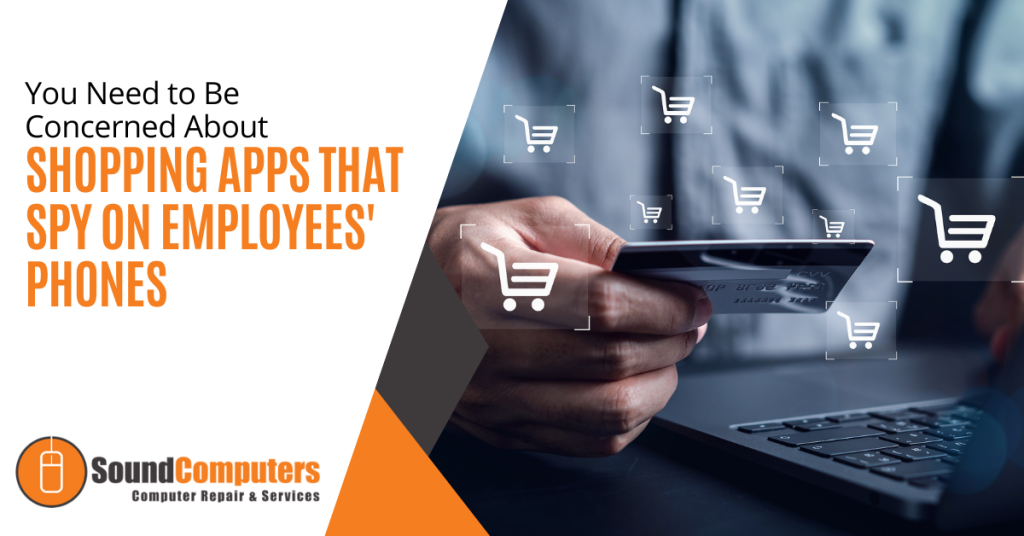
In recent years, online shopping has become more popular than ever before. With the convenience of being able to purchase items from the comfort of your own home, it is no surprise that many people are turning to shopping apps to make their purchases.
However, a new concern has emerged. There are shopping apps that spy on peoples’ phones. This is a serious risk to data security that needs to be addressed because it has the potential to compromise the privacy and security of individuals and the companies they work for.
Shopping Apps Recently Found to Be Spying
Recent events have brought this issue to the forefront. In one example, a popular shopping app called Shein was caught spying on users’ copy-and-paste activity. According to a report by MSN, the app in question was monitoring users’ clipboard data and sending it back to the app’s servers. This type of behavior is concerning because it means that the app has access to potentially sensitive information like passwords or other personal data.
In another example, Pinduoduo, a Chinese shopping app, was recently found to be infected with malware. According to a report by CNN, cybersecurity researchers discovered that the malware was designed to steal personal information from the device. The malware was able to access a wide range of sensitive data including usernames, passwords and credit card information.
These incidents highlight the serious threat posed by shopping apps that spy on employees’ phones. When an app has access to a smartphone that also has access to business apps and data, it can potentially monitor everything the employee does (including their emails, text messages and other communications). This can put both the employee and their company at risk because sensitive information could be compromised.
What Can You Do to Improve Mobile Device Security?
Many companies rely on an employee’s ability to use their personal mobile devices for work. However, this doesn’t mean you still can’t put device security measures in place to protect business data. Here are some ways to protect your network & data against invasive apps.
Implement a Mobile Device Management (MDM) Solution
MDM software can help you manage and secure the smartphones used by your employees. With an MDM solution, you can enforce security policies, remotely wipe devices if they are lost or stolen and monitor for potential security threats.
Applications like Intune (part of Microsoft 365) can help you better separate the “work” and “personal” functions of employee devices used for business.
Train Employees in Security Best Practices
Educate your employees on the importance of smartphone security and provide them with training on how to use their devices safely. This can include things like not clicking on suspicious links or downloading apps from unknown sources.
It is also a good idea to put out alerts in a company newsletter or team channel when news stories like the ones mentioned above come out. Sending your staff security updates like this helps foster a culture of cybersecurity and keeps everyone informed.
Use Strong Passwords and Two-Factor Authentication
Require your employees to use strong passwords and enable two-factor authentication whenever possible. This will make it more difficult for attackers to gain access to your employees’ devices and data.
Keep Software Up to Date
Ensure that all smartphones used by your employees have the latest software updates installed. Updates often include security patches that address known vulnerabilities.
This is another place where using a mobile device management solution can help. MDMs can deploy updates automatically to all managed devices.
Limit Access to Sensitive Data
Only give employees access to the data and applications they need to do their jobs. This will limit the potential damage if a smartphone is lost or stolen.
One of the ways you can do this is through automated data protection policies. Once implemented, they can prevent activities like downloading, copying and sharing certain types of documents.
Implement Encryption
Encrypt all sensitive data stored on smartphones including emails, text messages and files where possible. This will help protect the data if the smartphone is lost or stolen. Securing a business VPN account and requiring use when employees are connecting outside the office keeps traffic better protected as well.
Require Installation of a Reliable Mobile Antivirus
Mobile devices also need to have antivirus and anti-malware protection. You can provide this through a mobile device management solution or directly through a company subscription to a reliable antivirus solution.
Conduct Regular Security Audits
Regularly audit smartphone security to identify potential vulnerabilities or areas for improvement. This can include things like testing for malware or checking that security policies are being enforced.
Get Help with Smart Mobile Device Security Solutions
Sound Computers provides enterprise mobility management solutions that can significantly reduce your risk of a data breach. Contact us today to learn more.
